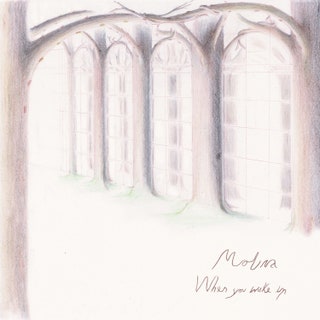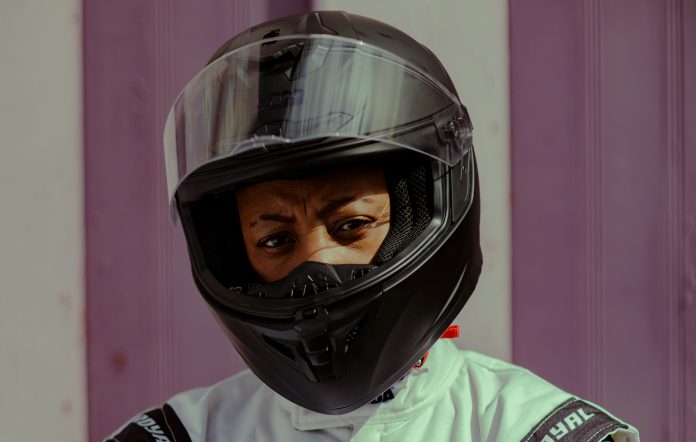
What would happen if all day long we focused on the repetition of a single rhythm: the ticking of a clock, a ceaseless hiccup, or the two-step thud thud of a heartbeat? When you wake up, the debut album from Danish Chilean artist Molina, gives an idea. Written largely while Molina was pregnant—a state of life defined by its sheer duration—the album is an exercise in intense presentness, one that holds the awe and exhaustion of embodied existence.
On it, Molina figures the body as a musical instrument. She plays guitar at the rate of breath. She sings, either airily or droningly, like she’s feeling her way around her own throat. When she strikes her percussion—whether an acoustic drum set or a sampler—she aims for the bones. Molina titled her first EP Corpus, the Latin word for “body,” and her work is indebted to the classical idea that musical rhythm arises from our bodies. The central nervous system transforms repetition into rhythm. Vibrations modulate into mood. A pulse becomes a beat. Molina straddles this conversion point between the biological and the musical.
Molina is among a coterie of musicians from Copenhagen, including ML Buch, Erika de Casier, Astrid Sonne, and Clarissa Connelly, who studied at Denmark’s esteemed Rhythmic Music Conservatory—a school that encourages individualist experimentation, and, more crucially, doesn’t charge for admission. Among the alumni, Molina’s thickly textured, almost gelatinous music is most comparable to that of Buch, with whom she’s toured. Both artists possess an almost academic interest in the intersections between bodies and machines, a bookishness disguised with distractingly good pop melodies. Molina is more surgical in her approach: Like a nurse on the night shift, her music is always searching for a pulse.
Molina begins When you wake up, as Buch began last year’s Suntub, in a state of blissful isolation: On “Navel,” there’s nothing to attend to, just the pleasure of disconnection. Guitars ring like tiny timbale bells. Molina’s voice goes toe-to-toe with the sound, a stone that floats upon every wave. “When I’m all alone/On the eagle’s chest,” she sings, like she’s floating or flying, while her music complicates her dreamy freedom. She plays in an ambiguous scale, giving the song an indeterminate mood that no two listeners will interpret the same way.
Her approach to guitar, and to songwriting in general on When you wake up, borrows from shoegaze. Each song is a wide and woozy landscape: “A New Day” a pixelating sunset coming in and out of focus, “I Am Your House” a Mica Levi-like city garden. It is as disarmingly romantic as any shoegaze record, and just as impressionistic.
Like the best shoegaze records, When you wake up plays with listeners’ perceptions, specifically the ability to detect underlying rhythms for ourselves. It’s most clear on the Buch collaboration “Organs,” which sounds like it’s timed to a million different metronomes. If a doctor were to scan the brain playing it, the MRI would bloom with color. Finding the pulse on When you wake up requires tuning the attention and locating a sense of time through our own psychobiological rhythms: a new kind of presentness that disturbs everything around it, turning the familiar surreal.

Manchester’s OneDa wants to prove how versatile she is on debut album ‘Formula OneDa’. Hotly tipped as the next rising star from the 0161, OneDa (real name Onye Ezeh) has supported the likes of Heavenly labelmates Kneecap and Baxter Dury and stood on some of the biggest musical stages in the UK – Boomtown, The Great Escape and Glastonbury to name a few. Now, the British-Nigerian rapper-producer wants to show her worth and eclecticism on ‘Formula OneDa’.
The record kicks off with ‘Let Me In’, which admittedly isn’t the most appealing opening track: over a repetitive saxophone-led instrumental produced by Fat Buddha, OneDa voices her frustration about gatekeepers allowing her talents to go unnoticed. Some bars are simple to a fault – a continuous problem throughout the record.
Luckily, ‘Formula OneDa’ shows a lot of promise. Other songs represent her strong storytelling better as she seamlessly shifts between grime, dance, and hip-hop, delving into a wide array of themes. The lofty synths and sing-songy refrains in ‘Major Pay’ make for an escapist tune, whilst autobiographical gem ‘Raised’ reveals the girl behind the music as she raps: “Raised on Church on Sunday / Teenage gunplay / Fuck the Lord, get money”.
OneDa is a self-proclaimed “Pussy Power Promoter”, as per the unapologetic 2023 EP ‘Pussy Power’. That uncompromising demeanour carries over to ‘Formula OneDa’; on ‘The Formula’, she reminds women of their power in an empowering interlude and bigs up all the “rude girls” on ‘Set It Off’, encouraging them to “not edit the image” and “just be you and just kill it”. You can hear that fierce aforementioned self-advocacy throughout these high-octane tracks, especially on ‘Pull Up’ and ‘Sometimes’, two songs that show her relentlessness to reach musical dominance.
‘Leader’ is the true highlight of the album. OneDa produced it herself, crafting a fun, arena-ready song while maintaining her uplifting ethos. She declares: “I was born to be a bad girl / I was born to be a leader, you know.” She also recites some of the bars in a thick Nigerian accent over the jungle-inspired song, which is a welcome addition.
OneDa shows that her pussy power is nothing to play with on ‘Formula OneDa’. The album is a fun and empowering stepping stone that will keep you energised for the rest of the year – hopefully it’s the catalyst to OneDa’s meteoric rise.
